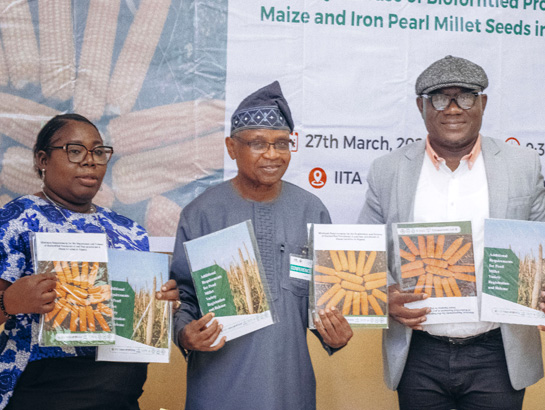Abuja, Nigeria — In a major step toward improving nutrition and food security in Nigeria, HarvestPlus, in collaboration with key stakeholders, has officially launched minimum standards for the variety release of biofortified vitamin A maize and iron pearl millet seeds. This landmark initiative is set to accelerate the adoption of these nutrient-rich crops, helping to combat hidden hunger and improve the health of millions, especially vulnerable groups like children and pregnant women.
A Nutritional Breakthrough for Nigeria
Micronutrient deficiencies, often referred to as hidden hunger, continue to pose serious health risks across Nigeria. Currently, vitamin A deficiency affects around 30 percent of children under five, while iron deficiency anemia remains widespread among women and children, leading to weakened immune systems, poor cognitive development, and increased maternal mortality.

By introducing biofortified maize and iron pearl millet, this initiative offers a sustainable, food-based solution to malnutrition—especially in rural communities where access to fortified foods and supplements is limited.
The newly established minimum standards will provide Nigerian seed breeders, farmers, and food processors with clear guidelines to ensure the production and distribution of high-quality, nutrient-enriched crop varieties. These standards serve as a critical foundation for promoting sustainable agricultural practices that directly contribute to the country’s food and nutrition security.
Collaboration Driving Impact
This milestone is the result of strong collaboration between HarvestPlus and a broad coalition of stakeholders, including the Nigerian government, the Federal Ministry of Agriculture and Food Security, research institutions such as the National Variety Release Committee, the National Centre for Genetic Resources and Biotechnology (NACGRAB), the International Institute of Tropical Agriculture (IITA), and the Institute for Agricultural Research (IAR). Support from seed companies, development partners including Propcom+, and farmer cooperatives has been instrumental in ensuring the successful rollout of these biofortified crops.
With the official release of these minimum standards, Nigeria is taking a significant step toward addressing malnutrition through science-driven agricultural innovations. The focus now shifts to increasing farmer adoption, strengthening the seed sector, and expanding consumer awareness of the health benefits of biofortified maize and pearl millet.
By investing in biofortification, Nigeria is not only enhancing its agricultural resilience but also securing a healthier future for its people.
